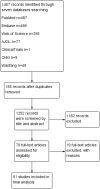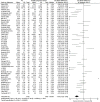Maternal serum zinc level is associated with risk of preeclampsia: A systematic review and meta-analysis
- PMID: 35979462
- PMCID: PMC9376590
- DOI: 10.3389/fpubh.2022.968045
Maternal serum zinc level is associated with risk of preeclampsia: A systematic review and meta-analysis
Abstract
Background: Preeclampsia (PE) is a multi-organ syndrome that onsets in the second half of pregnancy. It is the second leading cause of maternal death globally. The homeostasis of zinc (Zn) levels is important for feto-maternal health.
Objective: We aimed to collect all studies available to synthesize the evidence regarding the association between maternal Zn levels and the risk of preeclampsia.
Methods: A systematic review and meta-analysis was conducted via searching seven electronic databases [PubMed, Web of Science, Embase, African Journals Online (AJOL), ClinicalTrial.gov, and two Chinese databases: Wanfang and Chinese National Knowledge Infrastructure, CNKI]. Studies reporting maternal serum Zn levels in pregnant women with or without preeclampsia were included. Eligible studies were assessed through Newcastle-Ottawa Scale (NOS) and the meta-analysis was performed via RevMan and Stata. The random-effects method (REM) was used for the meta-analysis with 95% confidence interval (CI). The pooled result was assessed using standard mean difference (SMD). The heterogeneity test was carried out using I 2 statistics, and the publication bias was evaluated using Begg's and Egger's test. Meta-regression and sensitivity analysis was performed via Stata software.
Results: A total of 51 studies were included in the final analysis. 6,947 participants from 23 countries were involved in our study. All studies went through the quality assessment. The pooled results showed that maternal serum Zn levels were lower in preeclamptic women than in healthy pregnant women (SMD: -1.00, 95% CI: -1.29, -0.70). Sub-group analysis revealed that geographical, economic context, and disease severity may further influence serum Zn levels and preeclampsia.
Limitations: There are significant between-study heterogeneity and publication bias among included studies.
Conclusions: A lower level of maternal Zn was associated with increased risks of preeclampsia. The associations were not entirely consistent across countries and regions worldwide.
Systematic review registration: https://www.crd.york.ac.uk/prospero/display_record.php?RecordID=337069, Identifier: CRD42022337069.
Keywords: Zn; hypertensive disorder complicating pregnancy (HDCP); meta-analysis; preeclampsia (PE); systematic review; trace elements; zinc.
Copyright © 2022 Jin, Hu and Zheng.
Conflict of interest statement
The authors declare that the research was conducted in the absence of any commercial or financial relationships that could be construed as a potential conflict of interest.
Figures
References
-
- Ren M, Zhao J, Wang B, An H, Li Y, Jia X, et al. Associations between hair levels of trace elements and the risk of preterm birth among pregnant women: a prospective nested case-control study in beijing birth cohort (Bbc), China. Environ Int. (2022) 158:106965. 10.1016/j.envint.2021.106965 - DOI - PubMed
Publication types
MeSH terms
Substances
LinkOut - more resources
Full Text Sources




